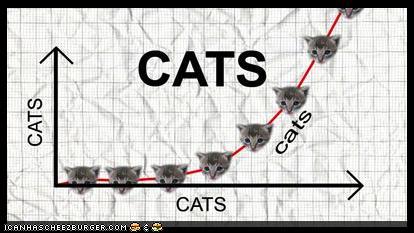
Tuesday, May 15, 2012
It's So Hard to Say Goodbye to Yesterday
Tuesday, May 1, 2012
WHY BAD?!?
The inspiration:
Labels:
as discussed in class,
cultural detritus,
fallacies,
videos
Sunday, April 29, 2012
B.S.
Here's the video of Jon Stewart interviewing Harry Frankfurt about his book On Bullshit (which you can read online for free here).
What do you think? Is not caring about whether you're telling the truth worse than deliberately lying?
What do you think? Is not caring about whether you're telling the truth worse than deliberately lying?
Saturday, April 28, 2012
Final Exam
Just a reminder: the final exam is Tuesday, May 1st. For the 8:00 class, the final is from 8:00-10:00 a.m., and for the 9:25 class, it is from 10:15 a.m.-12:15 p.m.
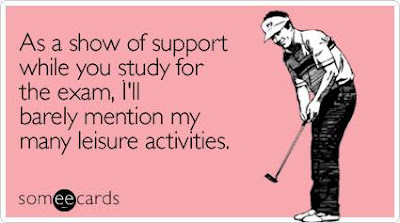

Friday, April 27, 2012
Last Chance
Just a reminder that the course evaluation for this class is only open two more days (today and tomorrow). If you haven't done it yet, go do it! Here are instructions:

1. Go to http://cp.rowan.edu/cp/.
2. Click "Student Self-Service" icon.
3. Click "Access Banner Services - Secure Area - login required"
4. Enter User ID and PIN.
5. Click "Personal Information".
6. Click "Answer a Survey".
7. Click on one of the student evaluations for your classes.
8. Complete the student evaluation.
9. Click “Survey Complete” to submit your completed student evaluation.
10. Repeat for other Spring 2012 classes.

Thursday, April 26, 2012
Open-mindedness
Here's an entertaining 10-minute video on open-mindedness, science, and paranormal beliefs.
I like the definition of open-mindedness offered by this video: it is being open to new evidence. This brings with it a willingness to change your mind... but only if new evidence warrants such a change.
Changing your mind has gotten a bum rap lately: flip-flopping can kill a political career. But willingness to change your mind is an important intellectual virtue that is valued by scientists.
I like the definition of open-mindedness offered by this video: it is being open to new evidence. This brings with it a willingness to change your mind... but only if new evidence warrants such a change.
Changing your mind has gotten a bum rap lately: flip-flopping can kill a political career. But willingness to change your mind is an important intellectual virtue that is valued by scientists.
Labels:
as discussed in class,
I'M-SPECIAL-ism,
intellectual honesty,
links,
psychological impediments
Wednesday, April 25, 2012
Intellectual Humility
I think there’s an important connection between intellectual honesty and humility. A simple goal of this class is to get us all to recognize what counts as good evidence and what counts as bad evidence for a claim. I think we've gotten pretty good at this so far. But this doesn’t guarantee that we’ll care about the difference once we figure it out.
Getting us to care is the real goal. We should care about good evidence. We should care about evidence and arguments because they get us closer to the truth. When we judge an argument to be overall good, THE POWER OF LOGIC COMPELS US to believe the conclusion. If we are presented with decent evidence for some claim, but still stubbornly disagree with this claim for no strong reason, we are just being irrational. Worse, we’re effectively saying that the truth doesn’t matter to us.
Instead of resisting, we should be open-minded. We should be willing to challenge ourselves--seriously challenge ourselves--and allow new evidence change our current beliefs if it warrants it. We should be open to the possibility that we’ve currently gotten something wrong. This is how comedian Todd Glass puts it:
Here are the first two paragraphs of an interesting article on this:

Getting us to care is the real goal. We should care about good evidence. We should care about evidence and arguments because they get us closer to the truth. When we judge an argument to be overall good, THE POWER OF LOGIC COMPELS US to believe the conclusion. If we are presented with decent evidence for some claim, but still stubbornly disagree with this claim for no strong reason, we are just being irrational. Worse, we’re effectively saying that the truth doesn’t matter to us.
Instead of resisting, we should be open-minded. We should be willing to challenge ourselves--seriously challenge ourselves--and allow new evidence change our current beliefs if it warrants it. We should be open to the possibility that we’ve currently gotten something wrong. This is how comedian Todd Glass puts it:
Here are the first two paragraphs of an interesting article on this:
Last week, I jokingly asked a health club acquaintance whether he would change his mind about his choice for president if presented with sufficient facts that contradicted his present beliefs. He responded with utter confidence. “Absolutely not,” he said. “No new facts will change my mind because I know that these facts are correct.”Ironically, having extreme confidence in oneself is often a sign of ignorance. Remember, in many cases, such stubborn certainty is unwarranted.
I was floored. In his brief rebuttal, he blindly demonstrated overconfidence in his own ideas and the inability to consider how new facts might alter a presently cherished opinion. Worse, he seemed unaware of how irrational his response might appear to others. It’s clear, I thought, that carefully constructed arguments and presentation of irrefutable evidence will not change this man’s mind.

Labels:
as discussed in class,
I'M-SPECIAL-ism,
intellectual honesty,
links,
more cats? calm down sean,
psychological impediments
Tuesday, April 24, 2012
Class Canceled (4/24)
I am sick again, so our class is canceled for today (Tuesday, April 24th). Sorry for the late notice.
Homework #3 is still due at the beginning of class on Thursday April 26th.

Homework #3 is still due at the beginning of class on Thursday April 26th.

Practical Advice
How can we counteract these cognitive biases we're learning about? Examining the way we think and becoming more aware of our biases is a good start, but is not in itself a solution.
One big point is to own our fallibility. Awareness of our limits and biases should lead us to lower our degree of confidence in many of our beliefs--particularly deeply held opinions and stances on controversial issues. Simply put, we should get in the habit of admitting (and sincerely believing) that there's a real chance that we're wrong.
Here are two other big, simple points I think make for some great practical advice:
One big point is to own our fallibility. Awareness of our limits and biases should lead us to lower our degree of confidence in many of our beliefs--particularly deeply held opinions and stances on controversial issues. Simply put, we should get in the habit of admitting (and sincerely believing) that there's a real chance that we're wrong.
Here are two other big, simple points I think make for some great practical advice:
- Get Unfamiliar! A
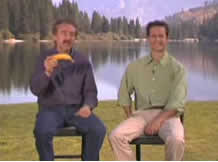 ctively seek out sources that you disagree with. We tend to surround ourselves with like-minded people and consume like-minded media. This hurts our chances of discovering that we've made a mistake. In effect, it puts up a wall of rationalization around our preexisting beliefs to protect them from any countervailing evidence.
ctively seek out sources that you disagree with. We tend to surround ourselves with like-minded people and consume like-minded media. This hurts our chances of discovering that we've made a mistake. In effect, it puts up a wall of rationalization around our preexisting beliefs to protect them from any countervailing evidence. - Focus on What Hurts! When we do check out our opponents, it tends to be the obviously fallacious straw men rather than sophisticated sources that could legitimately challenge our beliefs. But this is bad! We should focus on the best points in the arguments against what you believe. Our opponents' good points are worth more attention than their obviously bad points. Yet we often focus on their mistakes rather than the reasons that hurt our case the most.
Monday, April 23, 2012
Changing Habits
"If you want to change a habit, …don’t try and change everything at once. Instead, figure out what the cue is, figure out what the reward is and find a new behavior that is triggered by that cue and delivers that same reward. "
— Charles Duhigg, author of The Power of Habit, on Fresh Air
Less Wrong has several great posts on effective techniques for breaking bad habits and replacing them with better ones:
- The Science of Rationality
- Scientific Self-Help: The State of Our Knowledge
- Build Small Skills in the Right Order
- How to Beat Procrastination
Metacognition
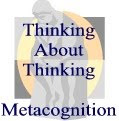 There's a name for all the studying of our natural thinking styles we've been doing in class lately: metacognition. When we think about the ways we think, we can vastly improve our learning abilities. This is what the Owning Our Ignorance club is about.
There's a name for all the studying of our natural thinking styles we've been doing in class lately: metacognition. When we think about the ways we think, we can vastly improve our learning abilities. This is what the Owning Our Ignorance club is about.I think this is one of the most valuable concepts we're learning all semester. So if you read any links, I hope it's these two:
Sunday, April 22, 2012
Status Quo Bias
Lazy, inert humans:
- If it already exists, we assume it's good.
- Our mind works like a computer that depends on cached responses to thoughtlessly complete common patterns.
- NYU psychologist John Jost does a lot of work on system justification theory. This is our tendency to unconsciously rationalize the status quo, especially unjust social institutions. Scarily, those of us oppressed by such institutions have a stronger tendency to justify their existence.
- Jost has a new book on this stuff. Here's a video dialogue about his research:
Saturday, April 21, 2012
Let's All Nonconform Together
If you like these links, I'll let you in my exclusive club:
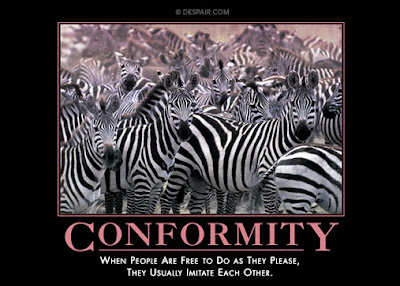
- On the influence of your in-groups and the formation of your identity: "If you want to set yourself apart from other people, you have to do things that are arbitrary, and believe things that are false." (from Paul Graham's "Lies We Tell Our Kids.")
- Here's a summary of two recent studies which suggest that partisan mindset stems from a feeling of moral superiority.
- Here's that poll showing the Republican-Democrat switcharoo regarding their opinion of Fed Chairman Ben Bernanke when the executive office changed parties.
- Our political loyalties also influence our view on the economy.
- Here's an article about a cool study on the relationship between risk and provincialism.
- Conformity hurts the advancement of science.

Friday, April 20, 2012
Paper Guideline
Due Date: the beginning of class on Tuesday, May 1st, 2012
Worth: 10% of final grade
Length/Format: Papers must be typed, and must be between 400-800 words long. Provide a word count on the first page of the paper. (Most programs like Microsoft Word & WordPerfect have automatic word counts.)
Assignment:
1) Pick an article from a newspaper, magazine, or journal in which an author presents an argument for a particular position.There are some links to potential articles here. I recommend choosing from those articles, though you are also free to choose an article on any topic you want.
PRO TIP: It’s easier to write this paper on an article with a BAD argument. Try finding a poorly-reasoned article!
If you don’t chose from the articles on the blog, you must show Sean your article by Tuesday, April 24th for approval. The main requirement is that the article present an argument. One place to look for such articles is the Opinion page of a newspaper. Here’s a short list of some other good sources:
Worth: 10% of final grade
Length/Format: Papers must be typed, and must be between 400-800 words long. Provide a word count on the first page of the paper. (Most programs like Microsoft Word & WordPerfect have automatic word counts.)
Assignment:
1) Pick an article from a newspaper, magazine, or journal in which an author presents an argument for a particular position.There are some links to potential articles here. I recommend choosing from those articles, though you are also free to choose an article on any topic you want.
PRO TIP: It’s easier to write this paper on an article with a BAD argument. Try finding a poorly-reasoned article!
If you don’t chose from the articles on the blog, you must show Sean your article by Tuesday, April 24th for approval. The main requirement is that the article present an argument. One place to look for such articles is the Opinion page of a newspaper. Here’s a short list of some other good sources:
- The New Yorker
- Slate
- New York Review of Books
- London Review of Books
- Times Literary Supplement
- Boston Review
- Atlantic Monthly
- The New Republic
- The Weekly Standard
- The Nation
- Reason
- Dissent
- First Things
- Mother Jones
- National Journal
- The New Criterion
- Wilson Quarterly
- The Philosophers' Magazine
2) In the essay, first briefly explain the article’s argument in your own words. What’s the position that the author is arguing for? What are the reasons the author offers as evidence for her or his conclusion? What type of argument does the author provide? In other words, provide a brief summary of the argument.
NOTE: This part of your paper shouldn’t be very long. I recommend making this only one paragraph of your paper.
3) In the essay, then evaluate the article’s argument. Overall, is this a good or bad argument? Why or why not? Systematically evaluate the argument:
- Check each premise: is each premise true? Are any false? Questionable? (Do research if you have to in order to determine whether the premises are true.)
- Then check the structure of the argument. Do the premises provide enough support for the conclusion?
- Does the argument contain any fallacies? If so, which one(s)? Exactly how does the argument commit it/them?
NOTE: This should be the main part of your paper. Focus most of your paper on evaluating the argument.
4) If your paper is not on one of the articles linked to on the course blog, attach a copy of the article to your paper when you hand it in. (Save trees! Print it on few pages!)
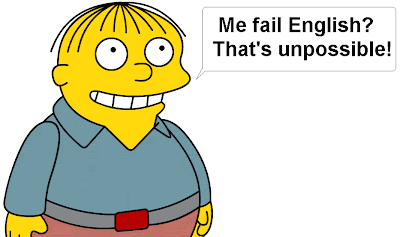
Labels:
as discussed in class,
assignments,
logistics
Thursday, April 19, 2012
Possible Paper Articles
Here are some links to a variety of articles you could use for your paper on explaining and evaluating an article's argument. I strongly recommend using one of these articles, since many (the first 8 in particular) contain bad arguments:

- Down With Facebook!: it's soooo lame
- Is Facebook Making Us Lonely? generational I'M-SPECIAL-ism
- Do Fish Feel Pain?: "it's a tricky issue, so I'll go with my gut"
- In the Basement of the Ivory Tower: are some people just not meant for college?
- Study Says Social Conservatives Are Dumb: but that doesn't mean they're wrong
- A New Argument Against Gay Marriage: hetero marriage is unique & indispensable
- Ben Stein's Confession for the Holidays: taking sides on the war on christmas
- Get Over Ferris Bueller: it's an overrated movie
- You Don't Deserve Your Salary: no one does
- The Financial Crisis Killed Libertarianism: if it wasn't dead to begin with
- How'd Economists Get It So Wrong?: Krugman says the least wrong was Keynes
- An Open Letter to Krugman: get to know your field
- Consider the Lobster: David Foster Wallace ponders animal ethics
- Are Dolphins People?: an ocean full of sea-people
- The Dark Art of Interrogation: Bowden says torture is necessary
- The Idle Life is Worth Living: in praise of laziness
- Should I Become a Professional Philosopher?: maybe not (update)
- Blackburn Defends Philosophy: it beats being employed

Subscribe to:
Posts (Atom)